摘 要
在我国,随着医药卫生体制改革的深入,药品库存规范化的推行以及日趋激烈的商业角逐,越来越多的医院意识到提高自身医院库房管理水平的重要性,也迫切要求加快管理信息化的进程。
在医院中,医院的药库管理以及相应的财务处理、信息处理,长期以来一直采用手工操作,但随着产业结构调整、全新的市场竞争环境,医院库房管理已经成为运营效率提高的关键所在,手工方式的弊端毕现无遗。这就要求医药库存管理摆脱过去人手操作的烦琐过程,对所有的医药库房管理数据实行智能管理,促使医药管理朝着科学化和规范化的方向前进。
随着计算机技术的普及,在医院中,医院逐渐借助计算机技术去完善医药的库房管理和提高自身的工作效率,以赢得市场竞争的胜利。因而医药库房管理信息系统已经成为各医药经营企业实现医药库房管理网络化和信息化的必备工具,是医院规模经营管理不可缺少的部件之一。同时,软件开发环境的高度集成和数据库技术的日益成熟成为开发医药库房管理信息系统的技术基础,大大降低了系统的开发成本。系统开发工具的智能化、人性化,使得所开发的系统充分满足了医院的各种需求,从医院的各个环节对人流、物流、资金流、信息流进行统一系统的管理。市场的需求和技术的支持,最终会导致越来越多的优秀医药库房管理软件的出现,并在竞争中得到不断的完善和优化。
根据当前社会现状和技术发展的不断进步,我们应用现有的技术和环境,开发了这个医院药品库房管理系统,不但提高了医院的经济效益,而且使医院信息管理工作尽快达到规范化、制度化、科学化的要求,并实现医院信息技术全电子无纸化和胶片管理的最终目标。
关键词 医药;管理;库存;数据库;Visual C#
Abstract
In our country, along with medical and health system reform deepens, stock pharmaceuticals, as well as the implementation of standardized increasingly fierce business competition, more and more aware of the hospital management of public hospitals to improve the level of importance, but also an urgent need to speed up the process of management information .
In the hospital, the hospital's management Drug Storehouse and the corresponding financial processing, information processing, has long been used manually, but with the adjustment of industrial structure, new market competition environment, the management of public hospitals has become the operating efficiency of the key , Manually complete the shortcomings are exposed. This requires pharmaceutical inventory management in the past out of the cumbersome process of manual operation, all of the medical management of the Treasury to implement intelligent data management so that the medicine toward the scientific and standardized management direction.
With the popularity of computer technology in the hospital, the hospital gradually the use of computer technology to improve the medical management of the treasury and improve their own efficiency in order to win victory in the competition. Medicine and therefore the Treasury Management Information System has become the pharmaceutical enterprises to realize network-based medicine to the Treasury Management and Information of the must-have tool is the size of the hospital operation and management of one of the essential components. At the same time, software development environment and a high degree of integration has become more sophisticated database technology into the development of Chinese medicine to the Treasury Management Information System-based technology has greatly reduced the system's development costs. The intelligent system development tools, humane, making the system fully developed to meet the diverse needs of the hospital, the hospital from the various segments of people, materials, capital flow, information flow for a unified management system. Market demand and technical support, eventually leading to an increasing number of outstanding treasury management software, medicine, and the competition has been constant improvement and optimization.
Based on the current status quo of social and technological development advances in the application of our existing technology and the environment, the development of hospital medicine to the Treasury Management System will not only improve the economic efficiency of the hospital, and hospital information management as soon as possible to achieve the standardization and institutionalization, Scientific requirements and information technology to achieve hospital-wide paperless electronic film and the ultimate goal of management.
Key words Medicine Management Stock Database Visual C#
课题的目的
在医院药品库房(以后简称医药)管理系统是在今天医疗事业的迅猛发展的前提下,以前的手工录入或早期的医药管理应用软件以逐渐不能满足用户的要求,而在这些问题当中,落后的医药管理已严重的影响医院工作人员的工作效率, 基于以上的原因,从而提出了医药管理管理系统的设计目标。
计算机应用于医院的日常管理,为医院的现代化带来了从未有过的动力和机遇,为医疗卫生领域的发展提供了无限的潜力。采用计算机管理信息系统已成为医院管理科学化和现代化的标志,给医院带来了明显的经济效益和社会效益。
在完成了针对医院管理系统前期调查,同时与多位医院使用者进行了全面深入地探讨和分析的基础上,明确地提出所要开发的软件应具有的功能、性能与界面,使系统分析人员及软件开发人员能清楚地了解用户的需求,进而完善了未来的医疗管理和服务工作。
通过信息数据高度共享,在强大的数据库的支持下,将医院的全面管理水平和服务质量提升到更高层次。医药管理系统结合医院管理工作的特点,充分利用局域网、广域网、大型分布式数据库等先进的计算机技术,运用系统的理论与方法将医院各组成部分的信息处理过程综合成有机整体,及时而有效地为医院日常管理和发展提供决策依据,使医院信息管理工作尽快达到规范化、制度化、科学化的要求,并实现医院信息技术全电子无纸化和胶片管理的最终目标。
课题的意义
医院药品库房管理信息系统使医院的管理信息化的同时,还简化了传统的人工手动的传统模式,使药库管理人员能够方便地利用药库中的已有的信息做出正确的判断,更重要的是利用计算机的技术可以使药库管理更加的规范化、数字化,并且提高了管理水平,降低管理成本,减轻员工的工作强度,大大提高了员工的工作效率,使医院管理达到高速的运转。药库管理系统的实施,还可以改变人们传统的管理思想误区,促进更好的管理思想的发展,以及现代化的管理模式的实施。
系统设计思想
系统的设计思想是对一个系统的基础认识,在此过程中将系统应具备的特性加以介绍,使用户明白本系统的好处以及特点。
系统的主要功能模块描述
本系统是医院管理的重要组成部分,与门诊部管理,住院部管理以及系统管理共同组成一个完整的医院管理系统,并且为了完成医药模块的具体功能,对其他模块也做了相应的编写。
本系统一共分为七大模块所有模块之间都是紧密关联的,本系统是一个典型的数据库开发程序。每个模块的功能都是按照在调研中搜集的资料进行编排制作的。依据上述功能的分析,系统在六大块的基础上每一大模块又分为几个模块
1. 控制台包括三个模块:修改密码,重新登录,退出系统。
2. 入库管理包括四个模块:首次入库,追加入库,入库记录查询,入库统计。
3. 信息设置包括三个模块:药品信息管理,数据对照,药品调价。
4. 退货管理包括四个模块:药库退货,退货记录查询,退货药品查询,厂商黑名单。
5. 查询明细包括两个模块:药库明细管理,药品报警管理。
6. 药品调拨管理包括两个模块:药品调拨,药局需求查询。
7. 退库管理包括两个模块:门诊退库管理,住院部退货管理。
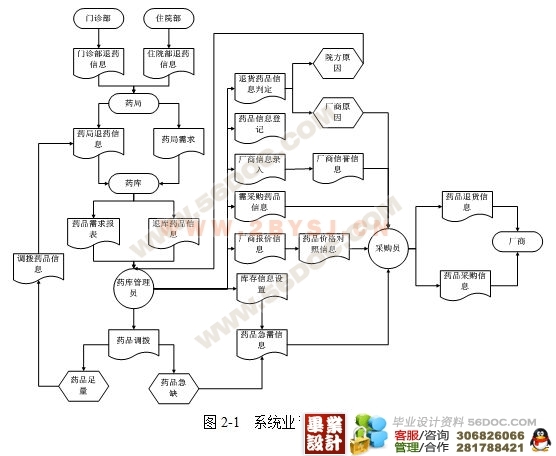
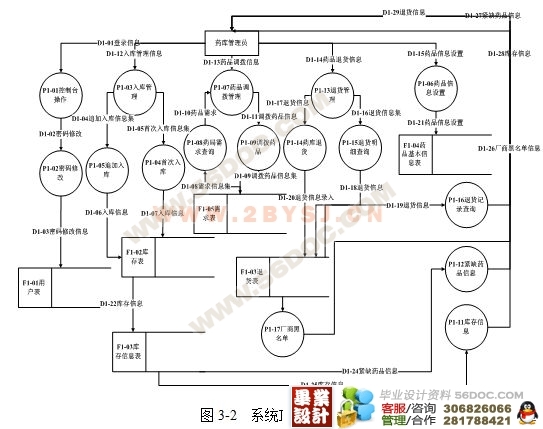
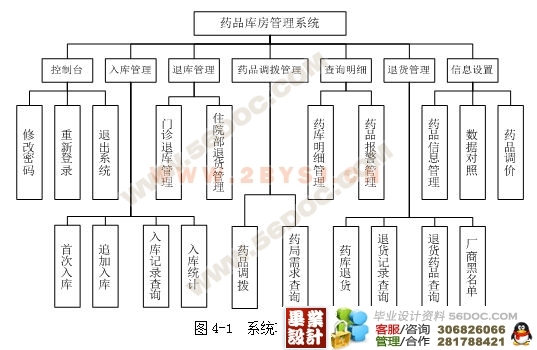
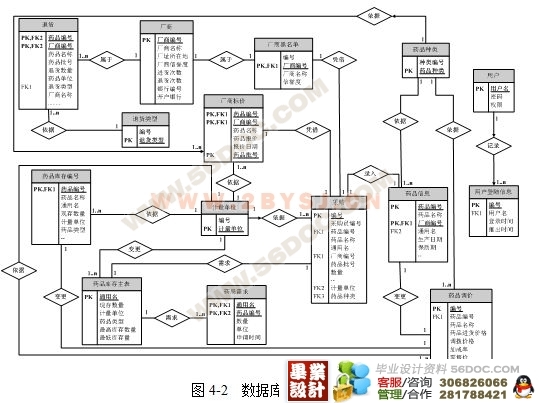
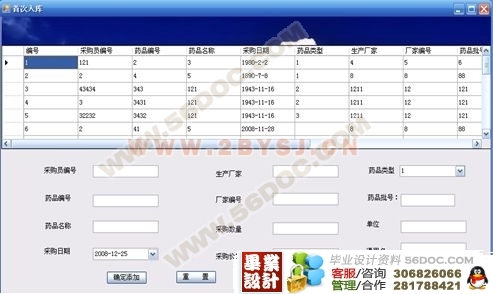
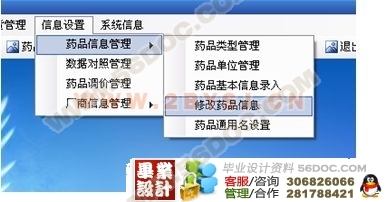
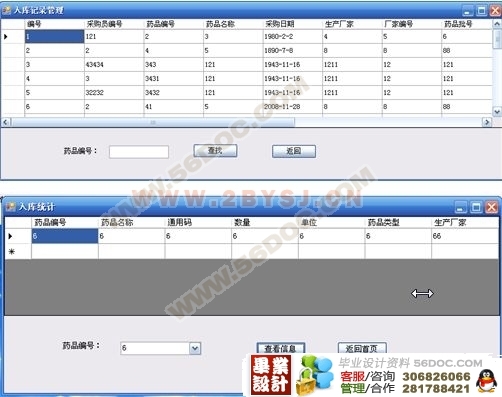
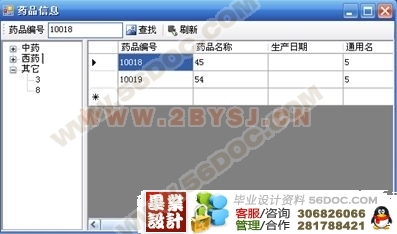
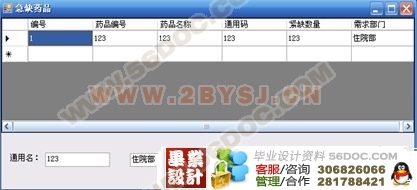
目 录
摘要 I
Abstract II
第1章 绪论 1
1.1 课题背景 1
1.1.1 课题的来源 1
1.1.2 当前研究现状 1
1.2 目的和意义 2
1.2.1 课题的目的 2
1.2.2 课题的意义 2
1.3 系统设计思想 3
1.3.1 系统的整体设计 3
1.3.2 系统的设计优点 4
第2章 可行性分析 5
2.1 业务流程图 5
2.1.1 本系统业务流程基本描述 5
2.1.2 本系统总体业务流程图 6
(毕业设计)
2.2 软件可行性分析 7
2.2.1 经济可行性 7
2.2.2 技术可行性 8
2.2.3 运行可行性 8
2.3 本章小结 9
第3章 需求分析 10
3.1 MIS系统的产生和发展情况 10
3.1.1 MIS系统的产生 10
3.1.2 MIS系统的发展情况 11
3.2 医院药品管理系统的需求分析 11
3.2.1 本系统数据流图 12
3.2.2 数据字典 14
3.3 本章小结 17
第4章 总体设计 18
4.1 系统模块总体设计 18
4.1.1 本系统总体功能模块设计 18
4.1.2 系统的主要功能模块描述 19
4.2 数据库设计 19
4.2.1 数据库设计概述 19
4.2.2 本系统数据分析 20
4.2.3 数据库的详细设计 20
4.2.4 数据库维护 21
4.3 本章小结 24
第5章 详细设计 25
5.1 系统运行平台设置 25
5.1.1 系统的硬件环境 25
5.1.2 系统的软件环境 25
5.2 开发工具简介 26
5.2.1 前台软件开发工具 26
5.2.2 后台数据库开发工具 26
5.2.3 相关开发技术简介 27
5.3 系统主界面设计 28
5.3.1 系统主界面设计 28
5.3.2 用户登录管理功能设计 29
5.4 入库管理模块功能设计 30
5.4.1 首次入库 31
5.4.2 追加入库 32
5.4.3 入库记录管理 33
5.4.4 入库统计 34
5.5 查询明细管理模块功能设计 35
5.5.1 药品明细查询管理 35
5.5.2 急缺药品信息管理 36
5.6 本章小结 37
第6章 系统测试与性能分析 38
6.1 软件测试 38
6.1.1 软件测试的原因 38
6.1.2 测试的基本概念 39
6.1.3 测试步骤 40
6.2 本系统测试 41
6.3 本章小结 41
第7章 系统主要功能使用说明 43
7.1 药品信息设置模块 43
7.2 入库管理信息模块 44
7.2.1 首次入库信息管理 44
7.2.2 追加入库药品信息管理 44
结论 46
致谢 47
参考文献 48
附录1 50
附录2 56 |

